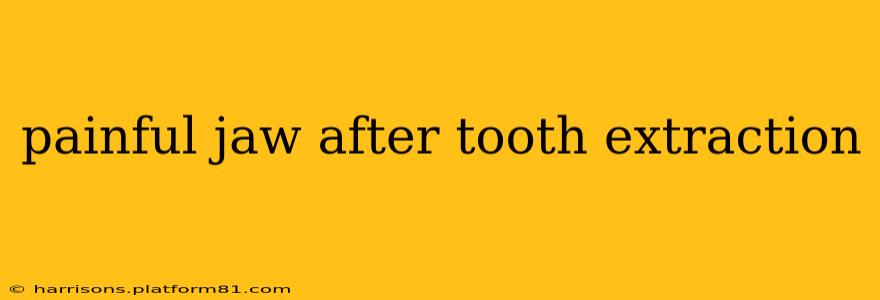Having a painful jaw after a tooth extraction is a common experience, but that doesn't make it any less unpleasant. Understanding the causes, potential complications, and effective management strategies can significantly improve your recovery and alleviate discomfort. This comprehensive guide will explore everything you need to know about jaw pain following tooth extraction.
Why Does My Jaw Hurt After a Tooth Extraction?
Jaw pain post-extraction is usually a result of the surgical procedure itself. The extraction process involves removing the tooth, often along with surrounding bone and tissue. This trauma can cause inflammation, swelling, and pain, not just at the extraction site but also radiating to the jaw. The pain can also be intensified by:
- Dry socket: This is a serious complication where the blood clot protecting the extraction site dislodges, exposing the bone and nerve endings. This causes severe, throbbing pain that can radiate to the jaw.
- Infection: Bacterial infection at the extraction site can lead to significant pain, swelling, and fever.
- Sinus perforation: If the extraction involves an upper molar, there's a risk of accidentally perforating the maxillary sinus. This can cause sinus pain that feels like jaw pain.
- Referred pain: Pain originating from the extraction site can sometimes be felt in other areas of the jaw due to the complex nerve pathways in the face.
- TMJ issues (Temporomandibular Joint Disorder): While not directly caused by the extraction, pre-existing TMJ problems can be exacerbated by the procedure.
How Long Should Jaw Pain After Tooth Extraction Last?
The duration of jaw pain varies greatly depending on several factors, including the complexity of the extraction, individual healing capacity, and the presence of complications. Generally, you can expect some discomfort for the first few days, gradually decreasing in intensity. Most people experience significant pain reduction within a week. However, persistent or worsening pain beyond a week warrants immediate attention from your dentist.
What Can I Do to Relieve Jaw Pain After a Tooth Extraction?
Managing post-extraction jaw pain is crucial for a comfortable recovery. Here are some effective strategies:
- Over-the-counter pain relievers: Ibuprofen (Advil, Motrin) or acetaminophen (Tylenol) are typically recommended to manage mild to moderate pain. Always follow the dosage instructions on the packaging.
- Ice packs: Applying ice packs to the affected area for 15-20 minutes at a time, several times a day, can help reduce swelling and numb the pain.
- Rest: Avoid strenuous activities and get plenty of rest to allow your body to heal.
- Soft foods: Stick to soft, easily chewed foods to minimize stress on the extraction site and jaw.
- Gentle rinsing: After 24 hours, gently rinse your mouth with saltwater (1/2 teaspoon of salt in a cup of warm water) several times a day to help keep the area clean and prevent infection.
- Avoid smoking and alcohol: These substances can interfere with healing and increase the risk of complications.
What Are the Signs of a Serious Problem After a Tooth Extraction?
While some discomfort is expected, certain signs warrant immediate medical attention:
- Severe, persistent pain that doesn't respond to over-the-counter pain medication.
- Excessive swelling or bruising.
- High fever.
- Pus or foul odor coming from the extraction site.
- Difficulty opening your mouth.
- Numbness or tingling in the face or jaw.
Can I Prevent Jaw Pain After a Tooth Extraction?
While you can't completely eliminate the risk of jaw pain, you can take steps to minimize it:
- Follow your dentist's instructions carefully. This includes medication, diet, and oral hygiene recommendations.
- Maintain good oral hygiene before and after the extraction. A healthy mouth promotes faster healing.
- Inform your dentist about any pre-existing medical conditions or medications you are taking. This will help them tailor the procedure and post-operative care to your specific needs.
When Should I Call My Dentist After a Tooth Extraction?
Contact your dentist immediately if you experience any of the signs of a serious problem listed above. Don't hesitate to reach out if you have any concerns, even if they seem minor. Early intervention can prevent more serious complications.
This information is for general knowledge and does not constitute medical advice. Always consult with your dentist or oral surgeon for any concerns regarding your specific situation. They can provide personalized recommendations based on your individual needs and medical history.
